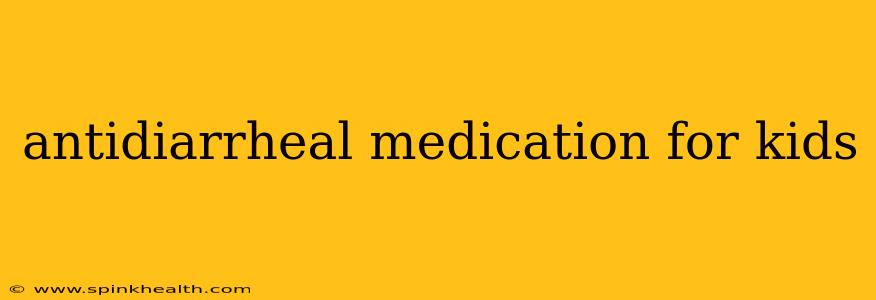Navigating the World of Antidiarrheal Medication for Kids: A Parent's Guide
The sudden onset of diarrhea in a child can be a terrifying experience for any parent. The frantic search for relief, coupled with worry about dehydration and discomfort, can feel overwhelming. While many cases of diarrhea resolve on their own, knowing when and how to use antidiarrheal medication for kids is crucial. This guide will delve into the complexities of treating childhood diarrhea, helping parents navigate this common childhood ailment with confidence and informed decision-making.
What Causes Diarrhea in Children?
Before we discuss medication, understanding the root cause of your child's diarrhea is paramount. Diarrhea isn't a disease in itself; it's a symptom of various underlying issues. Common culprits include viral infections (like rotavirus, norovirus), bacterial infections (like Salmonella, E. coli), parasitic infections, food allergies or intolerances (like lactose intolerance), and even certain medications. Sometimes, dietary changes or stress can trigger diarrhea as well. Accurate diagnosis is key to effective treatment, which is why consulting a pediatrician is always recommended.
When Should I Give My Child Antidiarrheal Medication?
This is a critical question. The simple answer: only when advised by a pediatrician. Over-the-counter (OTC) antidiarrheal medications are not always appropriate for children, and in some cases, can be harmful. Many pediatricians recommend a "wait-and-see" approach for mild cases of viral diarrhea, focusing instead on managing symptoms like dehydration. The potential risks of antidiarrheal medication often outweigh the benefits in young children, particularly for viral diarrhea, where prolonging the illness by suppressing symptoms might even be counterproductive.
What are the Different Types of Antidiarrheal Medications for Kids?
While there are several types of antidiarrheal medications available, they are typically not recommended for young children. Loperamide (Imodium) and bismuth subsalicylate (Pepto-Bismol) are common OTC options for adults, but their use in children is often restricted due to potential side effects. Pediatricians may prescribe other medications in specific cases, but these are generally used cautiously and only under strict medical supervision.
Are There Any Natural Remedies for Childhood Diarrhea?
Absolutely! Before reaching for medication, several gentle, home-based approaches can help manage symptoms and support your child's recovery:
- Hydration: This is the single most important step. Offer plenty of fluids – oral rehydration solutions (ORS), electrolyte drinks, or even clear broths – to replace lost fluids and electrolytes.
- Bland Diet: Stick to easily digestible foods like bananas, rice, applesauce, and toast (BRAT diet). Avoid fatty, greasy, or sugary foods.
- Rest: Ensure your child gets plenty of rest to aid their body's natural healing process.
What are the Side Effects of Antidiarrheal Medication in Children?
The side effects of antidiarrheal medications can vary depending on the medication and the child's age and overall health. However, some common potential side effects include:
- Constipation: This is a relatively common side effect, especially with loperamide.
- Drowsiness: Some antidiarrheal medications can cause drowsiness or lethargy.
- Allergic Reactions: Although rare, allergic reactions are possible.
It's crucial to discuss any potential side effects with your pediatrician before giving your child any antidiarrheal medication.
When Should I Call My Doctor About My Child's Diarrhea?
Immediate medical attention is needed if your child exhibits any of the following:
- Severe dehydration: Signs include sunken eyes, dry mouth, decreased urination, lethargy, and rapid heartbeat.
- Bloody or black stools: This could indicate a more serious underlying condition.
- High fever: A high fever accompanies some infections and requires immediate medical attention.
- Persistent vomiting: Inability to keep down fluids can lead to severe dehydration.
- Significant abdominal pain: Severe or persistent abdominal pain warrants immediate medical evaluation.
This information is intended for educational purposes only and should not be considered medical advice. Always consult with your pediatrician before giving your child any medication, including over-the-counter antidiarrheal medications. They can assess your child's individual needs and recommend the best course of action. Your pediatrician is your best resource for ensuring your child's health and well-being.

